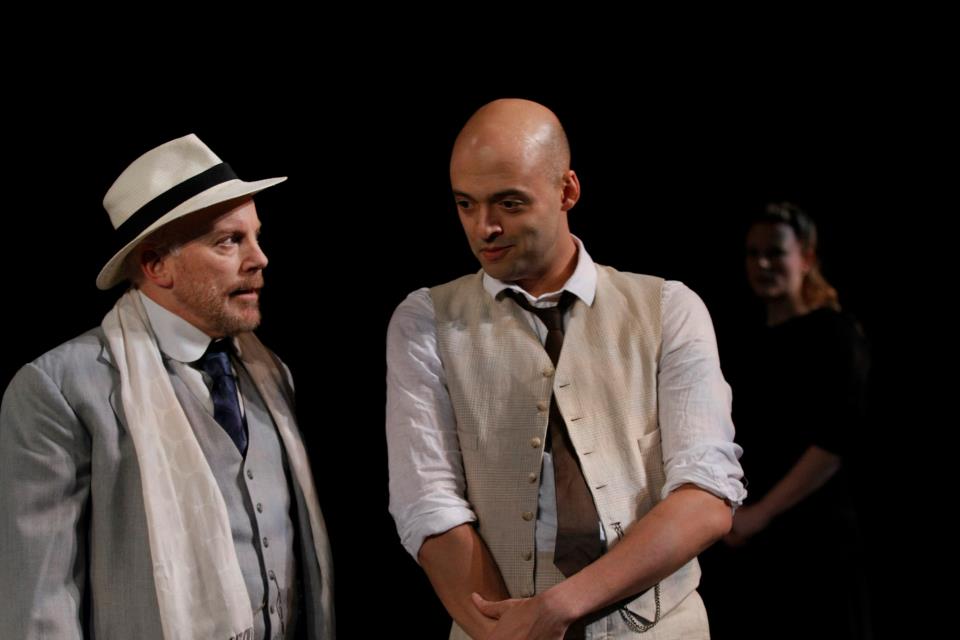
Peter Crook, Brandon J. Simmons and in the background, Hannah Victoria Franklin in “The Seagull”. Photo: Chris Bennion
Review: “The Seagull” by Anton Chekhov. Translated by Carol Rocamora. Produced by The Seagull Project. Directed by John Langs. With Julie Briskman, Brandon J. Simmons, John Bogar, Alexandra Tavares, CT Doescher, Peter Crook, Mark Jenkins, and Hannah Victoria Franklin. Now through February 10, 2013 at ACT.
Of course, it’s not impossible to stage a play by Russian playwright Anton Chekhov in the manner in which it was written…it’s just a really rare thing, at least in America (and, I’ve been told that it’s a problem in other English speaking countries as well.) Chekhov was a comedic writer, in both his stories and his plays, but the dark, very Russian humor of the material and plot elements that also include a lot of dramatic moments, like despair and death, have tended to confound directors and theater companies. HOW can such darkness be FUNNY? How do you play the comedy and still respect the drama? Briefly summarized, “The Seagull” is a play about a vain actress and her writer lover visiting her brother’s country estate and the havoc that develops between those characters and the actress’s neurotic son, the estate manager’s daughter, and the comely neighbor’s daughter over the course of a summer weekend, but of course, it’s much more than that. The actress is, frankly, a funny but selfish bitch, and the son is melodramatic, and there are numerous quirky characters and situations but the play also includes unrequited love, failed dreams and hopes, and a gunshot or two. It’s frequently very funny but it’s not consistently ha-ha funny and that’s the problem lesser theater companies face when mounting this play, or most Chekhov plays…how the hell do you balance the funny/tragic, dark/light, hope/despair inherent in the Chekhovian canon?
Well, the easy answer is: put together a team of artists who understand the material and are willing to explore all the subtexts and currents of that material and take some time to make the journey in creating the production. It’s good news for Seattle that a ridiculously talented bunch of local theater artists got together a couple of years ago and decided that they wanted to take the time to craft a lovingly mounted production of Chekhov’s “The Seagull”. They didn’t spend much effort on creating a name for their company; it’s called “The Seagull Project”, but all the energy saved in company naming went into putting together this exquisitely realized production, now on stage at ACT as part of their Central Heating Lab supporting new, young theater companies and their work.
And, the long gestation period for this project seems to have paid off. As directed by John Langs, “The Seagull” is a beautifully produced work that fully captures both the divine comedy and the utter despair inherent in Chekhov’s work….the funny parts are very funny, and the unfunny parts are wistfully stark and tragic in their pathos. Yes, you will laugh until you cry, then turn around and just weep into your vodka. Mr. Langs’ direction has cleverly embraced the very “Russian-ness” of the material in all its dark, sardonic and bitter glory. Centuries of oppression and a diet of beets and rye bread do not make for happy, go lucky people and the spirit of the Russian people and their culture can appear to be overly dark and depressing, but beneath the apparent darkness, there is a radiant light that permeates much of Russian culture and that is very much an integral part of Chekhov’s work in general and The Seagull specifically. Both that darkness and that light are given equal measure in this production with the result that it’s a fully realized Chekhovian work.
It’s largely due to Mr. Langs’ staging, including the beautifully choreographed picnic opening of Act II (in the script, not as presented in this production which breaks the play after Act III). The charms of the staging were also enhanced by the simple but very effective set and prop design by Jennifer Zeyl; the gorgeous costumes of Doris Black and the sun dappled lighting design by Andrew D. Smith. This production did not have a huge budget and all the design elements of “The Seagull” are simple but lovingly crafted. The costumes and set pieces LOOK deceptively rich and vibrant and highly appropriate for the setting and tone of this production and are an integral part of its success.
But, arguably, the greatest asset for “The Seagull” would be its actors since it’s a group of actors who set out to create this project and self-produce this work, and this ensemble has a dream cast of talented local actors. The four actor/producers who spearheaded this project: Brandon J. Simmons, Julie Briskman, Brandon J. Simmons, John Bogar and Alexandra Tavares also play the four primary roles of, respectively, the aging actress Arkadina; her neglected and artistically/romantically frustrated son, Konstantin; her current lover, the popular writer Trigorin; and finally, Nina, a bewitching young woman and would be actress who creates havoc in the lives in the other characters. Ms Briskman is superb as the vain glorious diva, the prototype for a thousand other “actressy” roles on stage and in film; her Arkadina is mercurial and imperious to everyone who surrounds her. Whether she’s venting on her poor son, or harassing her lover, or pennypinching with the servants, she’s a comic marvel, but she’s also tenderly effective in the more emotional scenes with Konstantin and Trigorin. It’s a terrific and commanding performance by Ms Briskman.
She’s equally matched by Mr. Simmons as poor Konstantin, the son who passionately tries to connect with his mother, the girl he loves, and the art of writing, but never manages to find a lasting connection to anything he desires. Konstantin is a hysterical and rather funny mess in the opening scenes of the play and Mr. Simmons is very good at playing the comedic sides of the character but also manages to underscore the humor with the essential pain that torments Konstantin’s soul. It’s a big, brave performance that encompasses all aspects of the character’s persona and it’s a performance that rivets from beginning to end.
There’s also very strong supporting work from Hannah Victoria Franklin as the lovelorn and alchoholic Masha who yearns for Konstantin but settles for the pedantic schlub Medvedenko who’s very charmingly played by CT Doescher. Both are comedic highlights of this production. And, in less obviously “funny” roles, both Peter Crook’s Dr. Dorn and Mark Jenkins’ Sorin provide superb “Chekhovian” characterizations that seem very authentically 19th Century Russian.
As for Trigorin and Nina, both John Bogar and Alexandra Tavares are fine in their roles, but their big scene at the end of Act II is the only weak moment in this production. Maybe it was opening night jitters or perhaps that scene needed a little more work, but the staging here wasn’t as sharp and the focus was hazy and diffuse. This was also the only scene in the production that could have used a bit more in design work and production values….it seemed to call for some subtle changes in lighting and a lighted backdrop or wall would have helped capture the mood of the scene as Trigorin admits his attraction to Nina, and she reveals her hopes to become an actress. It’s a tough scene, but an important one and while hesitancy is an important aspect to the motivations of the characters, the tentativeness of the direction, design and performances also resulted in this being the only scene of the night that felt unfinished and lacking in energy.
And, ending on a positive note, the other very enjoyable aspect of this production was how the focus of attention was evenly split between all the main characters. Many productions of “The Seagull” tend to focus on Nina, at the expense of the other major characters, but the ensemble nature of this production from its conception seems to have allowed the company to maintain that ensemble feeling. All four major characters seem of equal importance and the supporting characters are all skillfully woven into the narrative. It all results in a very satisfactory sense of wholeness and unity.
Who’s This For?
Well, everyone who enjoys well done ensemble theater. Chekhov lovers who have been keening for a production that does justice to the material. Anyone with a little bit of the sardonic Russian soul within them.

















